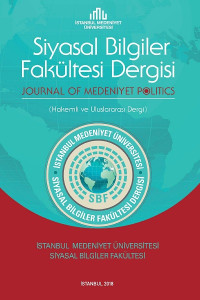Öz
Evrensel temel gelir, herhangi bir şarta bağlı olmadan tüm vatandaşlara düzenli olarak verilen
geçimlik gelir olarak tanımlanabilir. Her ne kadar evrensel temel gelir fikrinin kökenleri
çok eskiye dayansa da son yıllarda oldukça popüler hale geldiğini söylemek mümkündür.
Bu makalede, evrensel temel gelire Avrupa kamuoyunun desteği ESS (2016) veri seti üzerinden
incelenecektir. Temel gelir ve benzeri sosyal politikaların sadece yukarıdan aşağıya
müdahalelerle değil, aynı zamanda aşağıdan yukarıya kamuoyu baskısı ile oluştuğu düşünülürse
bu konunun önemi daha iyi anlaşılabilir. İlk önce betimsel istatistiklerin analizi,
sonra regresyon analizi üzerinden temel gelire popüler desteğin bireysel düzeydeki belirleyicileri
analiz edilecektir. Makalede, temel gelire popüler desteğin Avrupa ülkelerinde
mevcut refah rejimi, yaş, toplumsal cinsiyet, hane halkı geliri, işsizlik, hayat ve ekonomi
memnuniyeti, ideolojik konum ve dindarlık değişkenleri üzerinden belirlendiği ortaya konulmuştur.
Anahtar Kelimeler
Evrensel Temel Gelir Asgari Gelir Güvencesi Kamuoyu Desteği Sosyal Politika
Kaynakça
- Arthur, D. (2016, 18 Kasım) “Basic Income: a radical idea enters the mainstream,” Australian Parliament Research Papers, https://www.aph.gov.au/About_Parliament/Parliamentary_Departments/Parliamentary_Library/pubs/rp/rp1617/BasicIncome (Erişim tarihi: 18.02.2022)
- Baranowski, M., & Jabkowski, P. (2021). Basic income support in Europe: A cross-national analysis based on the European Social Survey Round 8. Economics & Sociology, 14(2), 167- 183.
- Esping-Andersen, G. (1990). The three worlds of welfare capitalism. Princeton University Press.
- Hughes, C. (2018). Fair shot: Rethinking inequality and how we earn. St. Martin's Press.
- IMF (2017). Fiscal Monitor: Tackling Inequality, https://www.imf.org/en/Publications/FM/Issues/2017/10/05/fiscal-monitor-october-2017 (Erişim tarihi: 18.02.2022)
- Kozák, M. (2021). Cultural productivism and public support for the universal basic income from a cross-national perspective. European Societies, 23(1), 23-45.
- Lee, S. (2021). Politics of Universal and Unconditional Cash Transfer: Examining Attitudes Toward Universal Basic Income. Basic Income Studies, 16(2), 191-208.
- Plan International (2017).Youth Unemployment: The Facts, https://plan-international.org/eu/youth-unemployment-facts (Erişim tarihi: 18.02.2022)
- Santends, S. (2017, 15 Ocak). “Why we should all have a basic income,” World Economic Forum, https://www.weforum.org/agenda/2017/01/why-we-should-all-have-a-basic-income/ (Erişim tarihi: 18.02.2022)
- Schwander, H., & Vlandas, T. (2020). The Left and universal basic income: the role of ideology in individual support. Journal of International and Comparative Social Policy, 36(3), 237-268.
- Rehm, P. (2011). Social policy by popular demand. World Politics, 63(2), 271-299.
- Vlandas, T. (2019). The politics of the basic income guarantee: Analysing individual support in Europe. Basic Income Studies, 14(1).
- Weller, C. (2016, 18 Mayıs). “A Nobel Prize winner in economics just backed basic income,” Business Insider, https://www.businessinsider.com/basic-income-gets-nobel-prize-winners-approval-2016-5 (Erişim tarihi: 18.02.2022)
- World Bank (2019). The Changing Nature of Work- World Development Report, https://www.worldbank.org/en/publication/wdr2019 (Erişim tarihi: 18.02.2022)
Public Support Towards Universal Basic Income in European Countries: Ordinal Logistic Regression Analysis
Öz
Universal basic income can be defined as a guaranteed income provided to all citizens without
any condition for at least bare minimum subsistence. Although the idea behind the universal
basic income is very old, it has become very popular in recent years. In this article,
the popular support of European citizens for a universal basic income propoosal will be examined
mainly through the ESS (2016) dataset. Considering the fact that basic income and
similar social policies are not constructed only by top-down interventions but also through
bottom-up public pressure, the importance of this issue can be better understood. First,
I will investitagate the descriptive statistics and then I will employ regression analysis in
order to figure out the individual-level determinants of popular support for basic income.
This article shows that the popular support for basic income in Europe is determined by the
current welfare regime, age, gender, household income, unemployment, life and economy
satisfaction, ideological position and religiosity parameters.
Anahtar Kelimeler
Universal Basic Income Guaranteed Minimum Income Public Support Social Policies
Kaynakça
- Arthur, D. (2016, 18 Kasım) “Basic Income: a radical idea enters the mainstream,” Australian Parliament Research Papers, https://www.aph.gov.au/About_Parliament/Parliamentary_Departments/Parliamentary_Library/pubs/rp/rp1617/BasicIncome (Erişim tarihi: 18.02.2022)
- Baranowski, M., & Jabkowski, P. (2021). Basic income support in Europe: A cross-national analysis based on the European Social Survey Round 8. Economics & Sociology, 14(2), 167- 183.
- Esping-Andersen, G. (1990). The three worlds of welfare capitalism. Princeton University Press.
- Hughes, C. (2018). Fair shot: Rethinking inequality and how we earn. St. Martin's Press.
- IMF (2017). Fiscal Monitor: Tackling Inequality, https://www.imf.org/en/Publications/FM/Issues/2017/10/05/fiscal-monitor-october-2017 (Erişim tarihi: 18.02.2022)
- Kozák, M. (2021). Cultural productivism and public support for the universal basic income from a cross-national perspective. European Societies, 23(1), 23-45.
- Lee, S. (2021). Politics of Universal and Unconditional Cash Transfer: Examining Attitudes Toward Universal Basic Income. Basic Income Studies, 16(2), 191-208.
- Plan International (2017).Youth Unemployment: The Facts, https://plan-international.org/eu/youth-unemployment-facts (Erişim tarihi: 18.02.2022)
- Santends, S. (2017, 15 Ocak). “Why we should all have a basic income,” World Economic Forum, https://www.weforum.org/agenda/2017/01/why-we-should-all-have-a-basic-income/ (Erişim tarihi: 18.02.2022)
- Schwander, H., & Vlandas, T. (2020). The Left and universal basic income: the role of ideology in individual support. Journal of International and Comparative Social Policy, 36(3), 237-268.
- Rehm, P. (2011). Social policy by popular demand. World Politics, 63(2), 271-299.
- Vlandas, T. (2019). The politics of the basic income guarantee: Analysing individual support in Europe. Basic Income Studies, 14(1).
- Weller, C. (2016, 18 Mayıs). “A Nobel Prize winner in economics just backed basic income,” Business Insider, https://www.businessinsider.com/basic-income-gets-nobel-prize-winners-approval-2016-5 (Erişim tarihi: 18.02.2022)
- World Bank (2019). The Changing Nature of Work- World Development Report, https://www.worldbank.org/en/publication/wdr2019 (Erişim tarihi: 18.02.2022)
Ayrıntılar
| Birincil Dil | Türkçe |
|---|---|
| Konular | Ekonomi |
| Bölüm | Makaleler |
| Yazarlar | |
| Yayımlanma Tarihi | 16 Ekim 2020 |
| Yayımlandığı Sayı | Yıl 2020 Cilt: 5 Sayı: 2 |


